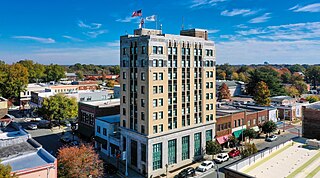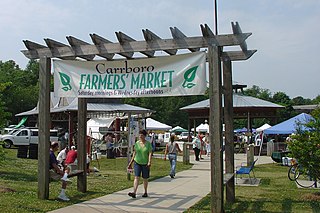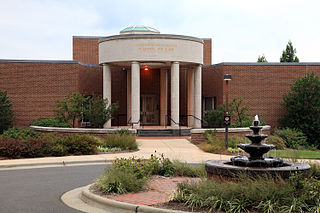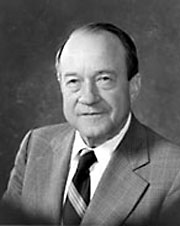
Burlington is a city in Alamance and Guilford counties in the U.S. state of North Carolina. It is the principal city of the Burlington, NC Metropolitan Statistical Area, which encompasses all of Alamance County, in which most of the city is located, and is a part of the Greensboro–Winston-Salem–High Point, NC Combined Statistical Area. The population was 57,303 at the 2020 census, which makes Burlington the 18th-most populous city in North Carolina.

Carrboro is a town in Orange County in the U.S. state of North Carolina. The population was 21,295 at the 2020 census. The town, which is part of the Raleigh-Durham-Chapel Hill combined statistical area, was named after North Carolina industrialist Julian Shakespeare Carr.
Susan Rose Wolf is an American moral philosopher and philosopher of action who is currently the Edna J. Koury Professor of Philosophy at the University of North Carolina at Chapel Hill. She taught previously at Johns Hopkins University (1986–2002), the University of Maryland (1981–1986) and Harvard University (1978–1981).

Frank Porter Graham was an American educator and political activist. A professor of history, he was elected President of the University of North Carolina at Chapel Hill in 1930, and he later became the first President of the consolidated University of North Carolina system.

Elon University is a private university in Elon, North Carolina. Founded in 1889 as Elon College, Elon is organized into six schools, most of which offer bachelor's degrees and several of which offer master's degrees or professional doctorate degrees.

William Brantley Aycock was an American educator who served as chancellor of the University of North Carolina at Chapel Hill from 1957 until 1964 and was the retired Kenan Professor of Law at the UNC School of Law. He was born in Lucama, North Carolina in 1915.
Walter M. Williams High School, the flagship school of the Alamance-Burlington School System, is a high school in Burlington, North Carolina, United States. It was named in honor of philanthropist, industrialist, and former Burlington City Schools chairman Walter M. Williams. The school entered its eighth decade of operation in the 2022 school year.

Woody Lombardi Durham was an American play-by-play radio announcer for the North Carolina Tar Heels football and men's basketball programs from 1971 to 2011.

The University of North Carolina School of Law, sometimes referred to as Carolina Law, is the law school of the University of North Carolina at Chapel Hill. Established in 1845, it is among the oldest law schools in the United States and is the oldest law school in the state of North Carolina.

Burlington Industries, formerly Burlington Mills, is a diversified American fabric maker based in Greensboro, North Carolina. Founded by J. Spencer Love in Burlington, North Carolina in 1923, the company has operations in the United States, Mexico, and India and a global manufacturing and product development network based in Hong Kong with over 8,000 employees on several sites in the United States, Canada and worldwide.
The Elon University campus is a 636-acre (2.57 km2) campus in Elon, North Carolina United States. The campus is located mostly along East Haggard Avenue between Manning Avenue and North Oak Avenue, and North Williamson Avenue between the railroad tracks and University Drive. Other minor streets travel through and into campus. The campus is about three miles (5 km) from Interstate 40/85 and abuts the city of Burlington.

The UNC Claude A. Adams Jr. and Grace Phillips Adams School of Dentistry is the school of dentistry of the University of North Carolina. It is located in Chapel Hill, North Carolina, United States. It is currently ranked second among all dental schools in the U.S. and is consistently ranked among the best in the world according to two independent rankings. Founded in 1950 as the UNC School of Dentistry, it was the only dental school in North Carolina until 2011, when East Carolina University School of Dental Medicine became the second. In 2019, the school received its largest single donation of $27.68 million, resulting in a name change to honor Dr. Claude A. Adams Jr. and Grace Phillips Adams. Dr. Adams was a North Carolina dentist that practiced in Durham until his death in 2018.

Over 8,000 undergraduate and graduate students live in campus housing at the University of North Carolina at Chapel Hill during a regular school year. Forty residence halls are grouped into 16 residential communities across campus.

John Sprunt Hill was a North Carolina lawyer, banker and philanthropist who played a fundamental role in the civic and social development of Durham, North Carolina, the expansion of the University of North Carolina at Chapel Hill and the development of rural credit unions in North Carolina during the first half of the 20th century.
William Rand Kenan Jr. was an American chemist, engineer, manufacturer, dairy farmer, and philanthropist.

Jeanette Marie Boxill is an American academic who was Senior Lecturer in Philosophy (ethics) at the University of North Carolina at Chapel Hill. She was also Chair of the Faculty and Director of Parr Center for Ethics. Her writing and teaching relate broadly with ethical issues in social conduct, social and political philosophy, feminist theory, and ethics in sports. She is editor of Sports Ethics: An Anthology and Issues in Race and Gender. She is past president of the International Association for Philosophy in Sport, serves on the board of the NCAA Scholarly Colloquium Committee, and chairs both the 2011 NCAA Scholarly Colloquium and the Education Outreach Program for the U.S. Anti-Doping Agency (USADA). For 25 years, Boxill was the public address announcer for UNC women's basketball and field hockey. She is a member of numerous professional associations and has won a number of awards for teaching and professional contributions. She resigned from UNC in 2015 in the wake of the UNC Chapel Hill academics-athletics scandal.

Dalton Larkin McMichael Sr. was an American textile executive and philanthropist. He was ranked among the top fifty most influential textile executives in the twentieth century by Textile World Magazine. He was inducted into the Class of 2003 American Textile Hall of Fame by the American Textile History Museum.
Richard J. "Dick" Richardson is an American former political scientist, holding the Burton Craig Professorship at University of North Carolina at Chapel Hill.

Nelson Ferebee Taylor was an American lawyer and educational administrator who served as chancellor of the University of North Carolina at Chapel Hill from 1972 to 1980.
Sarah Graham Kenan was an American heiress and philanthropist. She inherited a third of her sister's share of the Standard Oil fortune in 1917 and established the Sarah Graham Kenan Foundation. Through her foundation, Kenan contributed financially to various institutions including the Episcopal Diocese of East Carolina, the University of North Carolina, Duke University, Saint Mary's School, and the Duplin County Board of Education. Her home, located in the Market Street Mansion District in Wilmington, North Carolina, now serves as the official residence of the chancellor of the University of North Carolina at Wilmington. In 1930, through an endowment she made, the Southern Historical Collection was established at the University of North Carolina at Chapel Hill.













